(Digg this!) A few years ago, you’d be greeted with a blank face or a call to the local psychiatry service if you started going on about ‘listening to your downloaded podcasts’, but figures released from the BBC show how the format is continuing to grow in popularity.
A few years ago, you’d be greeted with a blank face or a call to the local psychiatry service if you started going on about ‘listening to your downloaded podcasts’, but figures released from the BBC show how the format is continuing to grow in popularity.
Launched last May, the BBC’s trial service has offered twenty podcasts for free download frlom their website.
According to figures released from the BBC, the weekly podcast from the Radio One ‘personality’ DJ Chris Moyles was downloaded nearly half a million times in December.
The mp3 podcast – called the ‘Best of Moyles’ (which frankly appears to us to be a contradiction in terms) – comes in the shape of a 20-minute broadcast featuring speech highlights from the week.
With a recorded 446,809 downloads over December, the broadcast earned Moyles the top spot in the first published chart of BBC radio downloads.
 The chart also revealed that nearly two million downloads took place during the BBC podcasting trials over December.
The chart also revealed that nearly two million downloads took place during the BBC podcasting trials over December.
Moyles said: “I’m very pleased we’re number one and that people are making an effort to listen to the show even if they can’t be bothered to get up early to hear us.”
It’s not just iPod-toting kids who are getting down with the BBC’s podcasting service, with Radio 4 enjoying a strong presence in the chart.
The popular Today Programme’s daily 8.10am interview notched up an impressive 413,492 downloads during December, and other programs like ‘From Our Own Correspondent’ and ‘In Our Time’ proved a hit.
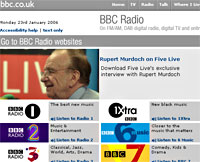 Simon Nelson, controller of BBC Radio & Music Interactive was enthusiastic: “It’s fantastic to see how the demand for radio downloads has grown since we first offered them in 2004. These figures underline the enduring relevance of radio in the digital world.”
Simon Nelson, controller of BBC Radio & Music Interactive was enthusiastic: “It’s fantastic to see how the demand for radio downloads has grown since we first offered them in 2004. These figures underline the enduring relevance of radio in the digital world.”
The BBC have stated that podcast trials are set to into 2006, with an expanded offering of programmes being provided to help them get a better understanding of listeners’ preferences.
BBC top ten most downloaded podcasts:
Best of Moyles (Radio 1)
Today 8.10 Interview (Radio 4)
Documentary Archive (World Service)
From Our Own Correspondent (Radio 4)
In Our Time (Radio 4)
Mark Kermode’s Film Reviews (Five Live)
Chris Evans – The Best Bits (Radio 2)
Go Digital (World Service)
Fighting Talk (Five Live)
Sportsweek (Five Live)
 Digital-Lifestyles has been informed, and can exclusively reveal, that BT is looking to shed its OU operations from its Media and Broadcast (BT M&B) division.
Digital-Lifestyles has been informed, and can exclusively reveal, that BT is looking to shed its OU operations from its Media and Broadcast (BT M&B) division. Despite BT as a whole being determined to move into new revenue opportunities like TV, there’s new breed of technology solutions for linking signals which are outside BT’s control. This bothersome issue is further squeezing their previously healthy profits, and the current cost base for BT’s OU services makes it difficult to justify continued operations, indeed we’ve been told that the OU is currently unprofitable. It’s hoped that a buyer will be able to make the operations pay, by reducing costs and realising synergies.
Despite BT as a whole being determined to move into new revenue opportunities like TV, there’s new breed of technology solutions for linking signals which are outside BT’s control. This bothersome issue is further squeezing their previously healthy profits, and the current cost base for BT’s OU services makes it difficult to justify continued operations, indeed we’ve been told that the OU is currently unprofitable. It’s hoped that a buyer will be able to make the operations pay, by reducing costs and realising synergies. Further deals for incumbent European telecoms operators are on the cards as they retreat into their core businesses. See France Telecom, who recently off-loaded one of its Paris Earth Stations to the satellite operator
Further deals for incumbent European telecoms operators are on the cards as they retreat into their core businesses. See France Telecom, who recently off-loaded one of its Paris Earth Stations to the satellite operator  So where do we start?
So where do we start?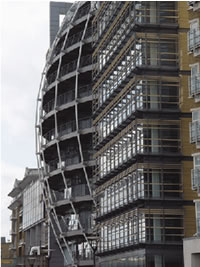 Naturally, there will always be those who say regulatory decisions made by organisations such as Ofcom are ‘independent’ and ‘evidence-based’ and therefore would be valid whoever happened to be in government. However, most people know Ofcom is ultimately a product of the government who created its remit – New Labour – and who on occasion have allowed the notion of ‘evidence-based’ regulation to underpin a culture of third party ‘experts’ who decide policy matters with a minimum of public participation or scrutiny.
Naturally, there will always be those who say regulatory decisions made by organisations such as Ofcom are ‘independent’ and ‘evidence-based’ and therefore would be valid whoever happened to be in government. However, most people know Ofcom is ultimately a product of the government who created its remit – New Labour – and who on occasion have allowed the notion of ‘evidence-based’ regulation to underpin a culture of third party ‘experts’ who decide policy matters with a minimum of public participation or scrutiny. If you were to consider UK telecoms, media, and technology (TMT) policy since Parliament passed the Communications Act 2003 and brought about the formation of Ofcom much has happened. The regulatory machinery of the state has swung into action with relative efficiency, taking on such issues as BT’s marketplace position, digital switchover, and public subsidy and control of broadcasting and new media. And we are starting – just starting – to see the results of some those efforts.
If you were to consider UK telecoms, media, and technology (TMT) policy since Parliament passed the Communications Act 2003 and brought about the formation of Ofcom much has happened. The regulatory machinery of the state has swung into action with relative efficiency, taking on such issues as BT’s marketplace position, digital switchover, and public subsidy and control of broadcasting and new media. And we are starting – just starting – to see the results of some those efforts.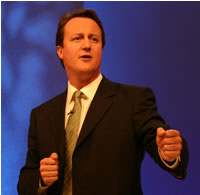 Certainly the party is already developing new ideas (or in some cases adopting the opposition’s cast-offs) in other policy areas. And by all accounts, David Cameron is doing an effective job of moving the Tories back toward the centre of British politics. The new leader appears flexible and open to new policy approaches. But nothing definite is happening in the TMT space. We think it should.
Certainly the party is already developing new ideas (or in some cases adopting the opposition’s cast-offs) in other policy areas. And by all accounts, David Cameron is doing an effective job of moving the Tories back toward the centre of British politics. The new leader appears flexible and open to new policy approaches. But nothing definite is happening in the TMT space. We think it should. UK TV broadcaster Channel 4 is joining the podcast steam train by launching their first podcast presented by the very excellent, Jon Snow, the front-man for the highly-regarded Channel 4 News.
UK TV broadcaster Channel 4 is joining the podcast steam train by launching their first podcast presented by the very excellent, Jon Snow, the front-man for the highly-regarded Channel 4 News.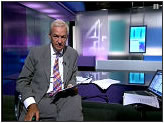 Big Chief, Channel 4’s Chief Executive, Andy Duncan, speaking at the Oxford Media Convention today (19th January), said: “We’re delighted Jon has agreed to present Channel 4’s first podcast. It’s great to be creating a genuine public service offering for new users on different platforms. And, as part of a possible bid for the new DAB national multiplex, it’s important that we start to explore the considerable potential to create cross-over content from the best of Channel 4’s output.”
Big Chief, Channel 4’s Chief Executive, Andy Duncan, speaking at the Oxford Media Convention today (19th January), said: “We’re delighted Jon has agreed to present Channel 4’s first podcast. It’s great to be creating a genuine public service offering for new users on different platforms. And, as part of a possible bid for the new DAB national multiplex, it’s important that we start to explore the considerable potential to create cross-over content from the best of Channel 4’s output.” Wi-Fi usage has still a long way to go before it really catches on in the UK according to a new survey carried out by Toshiba.
Wi-Fi usage has still a long way to go before it really catches on in the UK according to a new survey carried out by Toshiba. These figures seem in stark contrast to our recent
These figures seem in stark contrast to our recent  Not surprisingly, a fear of someone swiping their laptop played a big part in people’s reluctance to whip out the Wi-Fi (25%) as did privacy fears (27%).
Not surprisingly, a fear of someone swiping their laptop played a big part in people’s reluctance to whip out the Wi-Fi (25%) as did privacy fears (27%). In its submission this week to an MPs’ inquiry into Digital Rights Management (DRM), the influential National Consumer Council (NCC) spelt out its concern at current self-regulation, and called for new laws to ensure consumers’ rights to use digital content are protected.
In its submission this week to an MPs’ inquiry into Digital Rights Management (DRM), the influential National Consumer Council (NCC) spelt out its concern at current self-regulation, and called for new laws to ensure consumers’ rights to use digital content are protected. People are finding they can’t play the DVDs they’ve bought abroad or make compilations of material that they have purchased for their own use. The NCC believes that the use of DRM can and is already constraining the legitimate consumer use of digital content. It is also undermining consumers existing rights under consumer protection and data protection laws.
People are finding they can’t play the DVDs they’ve bought abroad or make compilations of material that they have purchased for their own use. The NCC believes that the use of DRM can and is already constraining the legitimate consumer use of digital content. It is also undermining consumers existing rights under consumer protection and data protection laws. Jill Johnstone, Director of Policy at NCC said; “Because of the current situation, consumers face security risks to their equipment, limitations on their use of products, poor information when purchasing products and unfair contract terms.
Jill Johnstone, Director of Policy at NCC said; “Because of the current situation, consumers face security risks to their equipment, limitations on their use of products, poor information when purchasing products and unfair contract terms. BT has cut short its ambitious plans to transform phone boxes into interactive Internet gateways.
BT has cut short its ambitious plans to transform phone boxes into interactive Internet gateways. In a public statement BT said, “There are no immediate plans to reduce the base of public multimedia kiosks other than moving to locations with better revenue earning potential and agreeing moves with our managed site owners.”
In a public statement BT said, “There are no immediate plans to reduce the base of public multimedia kiosks other than moving to locations with better revenue earning potential and agreeing moves with our managed site owners.” With the continuing exponential growth in Internet-enabled mobile phones and Wi-Fi, we wouldn’t be surprised if we see some of these all-singing phone terminals disappearing sooner rather than later.
With the continuing exponential growth in Internet-enabled mobile phones and Wi-Fi, we wouldn’t be surprised if we see some of these all-singing phone terminals disappearing sooner rather than later. A huge photograph of the Orion Nebula taken by the Hubble Space Telescope has been released on the Internet. It is thought to be one of the largest images every produced.
A huge photograph of the Orion Nebula taken by the Hubble Space Telescope has been released on the Internet. It is thought to be one of the largest images every produced. Around two years ago the previous version of this image was also distributed online, but that was a ‘mere’ 6,200 x 6,200, at that time, also claimed at the ‘largest image ever’.
Around two years ago the previous version of this image was also distributed online, but that was a ‘mere’ 6,200 x 6,200, at that time, also claimed at the ‘largest image ever’.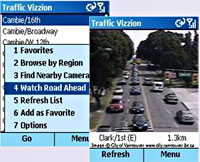 US firm Vizzion have announced the introduction of their innovative traffic-watching system “Traffic Vizzion” to eleven areas in the UK.
US firm Vizzion have announced the introduction of their innovative traffic-watching system “Traffic Vizzion” to eleven areas in the UK. GPS users can also call up a “Find Nearby Cameras” function to list cameras close to their current location, and then select and view any camera from the list in the hope of finding the best way out of a jam.
GPS users can also call up a “Find Nearby Cameras” function to list cameras close to their current location, and then select and view any camera from the list in the hope of finding the best way out of a jam. Traffic Vizzion runs on Windows Mobile 2003 for Smartphones, and relies on a working Internet connection (e.g. GPRS), with a Bluetooth GPS device required for the added features.
Traffic Vizzion runs on Windows Mobile 2003 for Smartphones, and relies on a working Internet connection (e.g. GPRS), with a Bluetooth GPS device required for the added features.